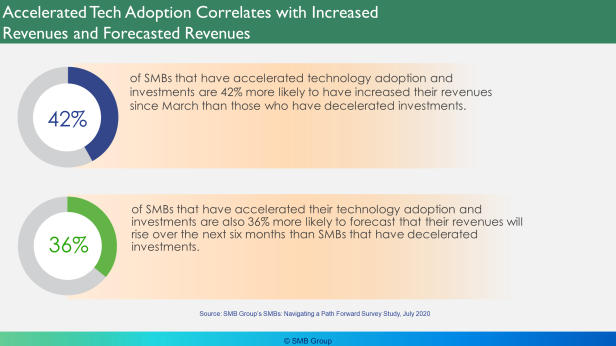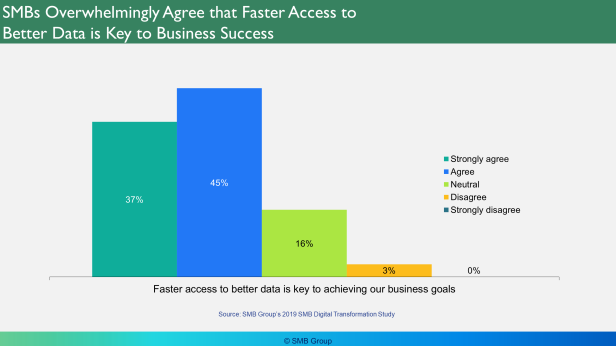Most SMB decision-makers understand that technology is increasingly intertwined with business success: 82% agree that using technology effectively is key sustaining and growing their businesses.
In fact, SMBs that have accelerated technology adoption and investments are 42% more likely to have increased their revenues since March than SMBs that decelerated tech investments—and are also 36% more likely to forecast that their revenues will rise over the next six months than SMBs that have decelerated in this area.

Among the many technological innovations that promise to help businesses improve performance, artificial intelligence (AI) and machine learning (ML) are arguably at the top of the list. These technologies take applications to the next level by making them smart—enabling them to predict patterns, spot anomalies, make recommendations, and take actions—and learn and improve how they do these things over time.
AI and ML have already become commonplace in many applications we use every day, for instance:
- Amazon and Netflix use these technologies to surface recommendations to us based on aggregated customer data.
- Google Maps and Waze, use anonymized location data from our smartphones to analyze the speed of traffic, reduce travel time by suggesting the fastest routes to and from destinations.
- Credit card processors use AI and ML to help prevent fraudulent transactions, and minimize the number of legitimate transactions declined due to being falsely identified as fraudulent.
These technologies are already starting to provide businesses with the ability to more easily analyze and learn from the vast and ever-increasing amounts of data that we create—but are still in their infancy. Futurist Kevin Kelly predicts that, will become the new infrastructure powering a second industrial revolution.
Financial professionals need to understand and guide their companies to take advantage of these technologies to compete effectively in an increasingly data-driven economy.
The Impact of AI and ML on Accounting and Finance
Accounting and finance are at the core of every organization, and numbers are at the core of accounting. Accurate, comprehensive, and timely data provides companies with the insights required to make decisions that will result in the best outcomes—while even one mistake can trigger significant problems for a business.
AI and ML can automate and take errors out of manual, repetitive, and time-consuming tasks—providing accountants with better information and freeing them up focus on more strategic aspects of the business.
As vendors embed AI and ML into their accounting and financial systems, these technologies will automate many tasks, such categorizing expenses, flagging policy violations, spotting trends and anomalies, providing alerts, and making recommendations.
Financials solutions built on multi-tenant, cloud-based platforms, such as Sage Intacct, bring some inherent advantages to the table when it comes to helping SMBs optimize the value of AI and ML. The more data that these intelligent systems and algorithms have, the smarter they get.
Data flows into multi-tenant cloud platforms in real-time, ensuring that the information the system is working with is up-to-date and trustworthy. Furthermore, financials solutions built on multi-tenant cloud platforms can draw upon aggregated, anonymized data from thousands of customers to expand and improve AI and ML capabilities and insights for all customers.
Examples of How AI and ML Improve Financial Management
AI and ML will profoundly change financial management by streamlining routine functions and putting more analytical power directly into the hands of financial professionals and other decision makers.
While possible use cases are limited only by our imaginations, many practical examples are already surfacing, such as:
- Accounts payable and receivable: Embedding AI and ML into cloud-based accounting software can eliminate the grunt work involved with accounts payable and receivable. For instance, when AI and ML algorithms are integrated into the AP process, the application can read invoices, extract data, code the invoice to the right general ledger accounts, approve the process, and make the payment.
- Expense management and auditing: Not too long ago, expense tracking and management was tedious for everyone involved. But with AI and ML, expense management applications can now read receipts, analyze and categorize expenses, and notify employees or managers if an expense doesn’t conform to company policies. In turn, this ensures that the expense claims submitted to finance are more accurate.
- Monthly and quarterly close: Getting the right information as quickly and accurately as possible helps you make better decisions. Cloud-based financial systems infused with AI and ML can easily crunch through and analyze larger quantities of internal and external data to help close the books faster.
- Better decision-making every day: The same capabilities that speed up the closing process also enable real-time reporting and queries. Sage Intacct sees this as eventually enabling a “continuous close” through its cloud-based financials platform. Data is updated in real-time, giving decision makers round-the-clock access to trustworthy, current information and reports. With this information at their fingertips every day, managers can easily track trends and take actions as needed to improve outcomes—instead of waiting for reports at the end of the month.
- Recommendations: As financial systems get more intelligent, they’ll be able to make action-based recommendations based on the data. For instance, they’ll be able to do help businesses predict cash flow over a given time period, and recommend actions to take to correct potential negative cash flow.
By layering chatbots and natural language processing (NLP) interfaces on top of these applications, users will also gain a more intuitive, conversational way to query the data in their systems to get the answers they need.
Perspective
As the Economist put it in 2017, data is the new oil. Those that can use data to create business value and opportunity have a growing competitive advantage over those that can’t.
This means that it’s not a question of if, but when and how quickly businesses will put automation, AI and ML to work to eliminate routine accounting work, save money, and improve their problem-solving and decision-making capabilities. In fact, SMBs overwhelmingly agree that faster access to better data is critical to helping them to achieve their business goals.

Although some worry that AI and ML will put accountants out of business, we disagree. Instead, we see these technologies changing the role of financial professionals. These technologies will automate tasks, speed calculations and provide easier and faster access to richer information. But human beings will still need to analyze, interpret, and provide guidance regarding this information.
Financial professionals that lead the charge and help their businesses take advantage of AI and ML will be have time to focus on these more strategic aspects of the business and deliver more value to their organizations.
This is the first post in a two-part blog series sponsored by Sage Intacct that examines the role of AI and ML in reshaping business processes and decision-making. It was originally published here.
©SMB Group
Source: Laurie McCabe’s Blog
